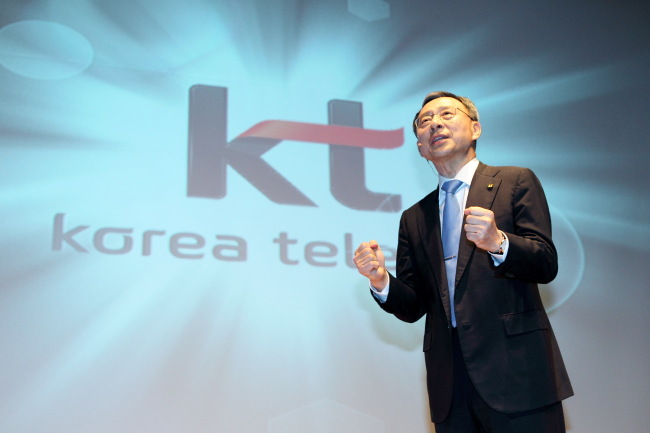KT launches ‘autobahn’ service
CEO Hwang seeks to change firm’s makeup for media ubiquity
By Park Hyung-kiPublished : May 20, 2014 - 21:02
Beset by a series of scandals and losses, South Korea’s biggest telecom company KT Corp. is aiming to extricate itself from the doldrums by the latter half of this year by providing the fastest network service available.
Introducing its “GiGA” service, which converges the technologies of Wi-Fi, Long Term Evolution and copper wires, KT aims to change the market, in which telecom companies are heavily focused on attracting consumers through irregular pricing strategies.
KT CEO Hwang Chang-gyu, a former head of Samsung Electronics’ semiconductor business, said his vision of a “telecom autobahn” through the superfast GiGA will lead the market to embrace the Internet of Things.
“I expect that the law of connected devices to outnumber people will outlive my own Hwang’s Law,” Hwang told the press on Tuesday.
Introducing its “GiGA” service, which converges the technologies of Wi-Fi, Long Term Evolution and copper wires, KT aims to change the market, in which telecom companies are heavily focused on attracting consumers through irregular pricing strategies.
KT CEO Hwang Chang-gyu, a former head of Samsung Electronics’ semiconductor business, said his vision of a “telecom autobahn” through the superfast GiGA will lead the market to embrace the Internet of Things.
“I expect that the law of connected devices to outnumber people will outlive my own Hwang’s Law,” Hwang told the press on Tuesday.

The term “giga” derives from gigabyte. But Hwang, who predicted while heading Samsung’s chip business that memory capacity would double every year, explained that in Chinese characters, “gi” means energy and “ga” refers to households, technology and leaping forward, as GiGA seeks to “take off with the new energized service and technology for consumers.”
It will especially benefit consumers who watch higher-resolution media content such as ultrahigh-definition shows as the convergent service would be three times faster than stand-alone LTE and 10 times faster than existing broadband connections.
The company will invest 4.5 trillion won ($4.4 billion) over the next three years to boost its network platform as Hwang forecast a “media boom” following the mobile boom.
“Every device will eventually become a TV,” said Hwang, emphasizing the need to change its DNA for the coming age of media ubiquity.
“The telecom market has not become saturated, and still has room for more growth as we will see an increase in access to (UHD) TV,” he added.
He said the company will mobilize all of its resources, ranging from satellite broadcasting and content producing to wireless and fixed-line technologies to provide a unique UHD experience to consumers.
KT will apply the technology to other business-to-business fields such as smart transportation, health, energy and safety.
Hwang especially focused on the importance of developing security and safety systems in light of the devastating Sewol sinking that has left more than 300 dead or missing.
“We will lead in developing a communication system enabling disaster prevention for people’s safety,” he said.
By Park Hyong-ki (hkp@heraldcorp.com)


![[Exclusive] Korean military set to ban iPhones over 'security' concerns](http://res.heraldm.com/phpwas/restmb_idxmake.php?idx=644&simg=/content/image/2024/04/23/20240423050599_0.jpg&u=20240423183955)




![[Pressure points] Leggings in public: Fashion statement or social faux pas?](http://res.heraldm.com/phpwas/restmb_idxmake.php?idx=644&simg=/content/image/2024/04/23/20240423050669_0.jpg&u=)

![[Herald Interview] 'Amid aging population, Korea to invite more young professionals from overseas'](http://res.heraldm.com/phpwas/restmb_idxmake.php?idx=644&simg=/content/image/2024/04/24/20240424050844_0.jpg&u=20240424200058)








